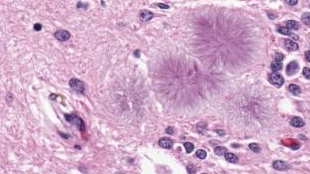 Brain tissue from Creutzfeldt-Jakob disease patientPUBLIC HEALTH IMAGE LIBRARY, SHERIF ZAKIWhen misfolded, prions can multiply to create large prion aggregates that cause diseases such as scrapie, mad cow, and Creutzfeldt–Jakob disease in humans. But before they become misfolded, prions play an important role in the brain. A new study published this week (February 13) in the Journal of Neuroscience has now shown that properly folded prions are important in neuronal plasticity, or learning, during development.
Brain tissue from Creutzfeldt-Jakob disease patientPUBLIC HEALTH IMAGE LIBRARY, SHERIF ZAKIWhen misfolded, prions can multiply to create large prion aggregates that cause diseases such as scrapie, mad cow, and Creutzfeldt–Jakob disease in humans. But before they become misfolded, prions play an important role in the brain. A new study published this week (February 13) in the Journal of Neuroscience has now shown that properly folded prions are important in neuronal plasticity, or learning, during development.
Earlier studies demonstrated other functions for prions in the brain. For example, the cells responsible for creating insulating sheathes that speed neuronal transmission require normal prion proteins to function properly. But normal prions are abundant not only in these supporting cells but also in neurons themselves, especially during development.
In order to test if this abundance might affect learning, researchers from the International School for Advanced Studies in Trieste, Italy, took brain slices from mice lacking the ability to make prions, and tested how well the neurons strengthened their connections when electrically stimulated—an cellular-level proxy for learning. When hippocampal brain sections lacking prions were stimulated, the neurons unable to form stable connections, and the connections that had already formed grew weaker.
“The function of cellular ...




















